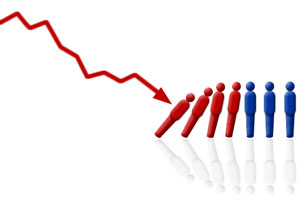
The medical device industry has already lost some 33,000 jobs as a result of the medical device tax, according to a report from lobbying group AdvaMed.
Including indirect repercussions in related industries and the economy in general, AdvaMed estimated that as many as 165,000 jobs have been compromised due to the impact of the 2.3% medical device sales tax that took effect last year. The findings came from an AdvaMed survey of its member companies, using responses from 38 firms to extrapolate effects in the industry at large.
"Contrary to the claims of some of the proponents of this tax, companies are simply not able to pass the tax on and are not anticipating a windfall from expanded coverage," AdvaMed president & CEO Stephen Ubl said in a conference call with reporters today. "At a time when unemployment remains at historic highs and there is bipartisan interest in growing advanced manufacturing jobs here in America, our industry is experiencing an unprecedented real-world negative impact on jobs and R&D due to this tax."
In addition to layoffs, device makers slashed their R&D budgets, reduced employee pay, moved manufacturing overseas, reduced spending in start-ups, canceled or put off new facilities and took other actions to deal with the cost of the new levy, according to the report.
The results paralleled some findings from a recent Emergo Group survey that similarly reported lowered R&D spending and job losses in 2013 as a result of the medical device tax. The Emergo survey, however, also found that fewer medtech executives reported negative effects overall than had been expected. An increasing percentage reported that the tax had no impact on their company in 2013.
"Overall, the impact of the [medical device excise tax] is being felt by industry, but the impact seems to be less severe than depicted by the media and industry organizations," according to Emergo.
AdvaMed’s survey brought a far different message, highlighting that a significant number of survey respondents said that they slashed their R&D budgets, moved jobs overseas and took other undesirable steps in response to the tax. Looking forward, half said they would continue lowering R&D and 58% said they would consider additional layoffs if the tax were not repealed.
"As a start-up company getting ready to launch a product, the [medical device excise tax] will create a $300K potential debt/cash-flow problem," one anonymous respondent wrote. "I can’t afford to be successful!"
"We are likely to close a U.S. plant which will offset about 70-80% of the cost of the MDET," wrote another.
AdvaMed’s survey included companies from 17 U.S. states, representing offices and jobs in all 50 states. Companies were split about halfway between revenues under $100 million and those with higher sales, and 40% were operating at an annual loss. In total, the companies represented $35.5 billion in annual revenue, about 22% of the total industry.
The lobbying group has been actively fighting the medical device tax since its inception during discussions that shaped the Affordable Care Act, but has been stone-walled in part by difficulties finding a way to make up for lost federal revenues. The tax is slated to bring in about $30 billion to help fund healthcare reform, and AdvaMed and other industry groups have maintained that finding a so-called "pay-for" to replace that funding is a task best left to Congress.
"We’re ambivalent about the funding source for repeal," AdvaMed chairman and Zimmer Holdings (NYSE:ZMH) president & CEO David Dvorak said during today’s call. "This is a new year and potential pay-fors are yet to be identified. We, frankly, believe that it’s a matter that policy-makers ought to take on."
Repeal efforts have garnered significant attention and support from both sides of the aisle. A House bill to repeal the levy has 270 co-sponsors, including 43 Democrats, Dvorak said. The Senate version has 38 co-sponsors, including 6 Democrats.
Calls for repeal continue to gain lawmaker support, but previous pay-for proposals have rubbed Democrats the wrong way and President Barack Obama has on more than 1 occasion promised to veto a device tax repeal bill should one land on his desk. Former President Bill Clinton reiterated the importance of finding a pay-for, telling an audience of healthcare stakeholders in Laguna Beach, Calif., last monthly that efforts to repeal the medical device tax must come with a strategy to make up the lost funds.
"You’ve got medical device people, they hate the tax," Clinton said during January’s Patient Safety, Science & Technology Summit. "If you want to get rid of it you’ve got to say how you’d replace it."

